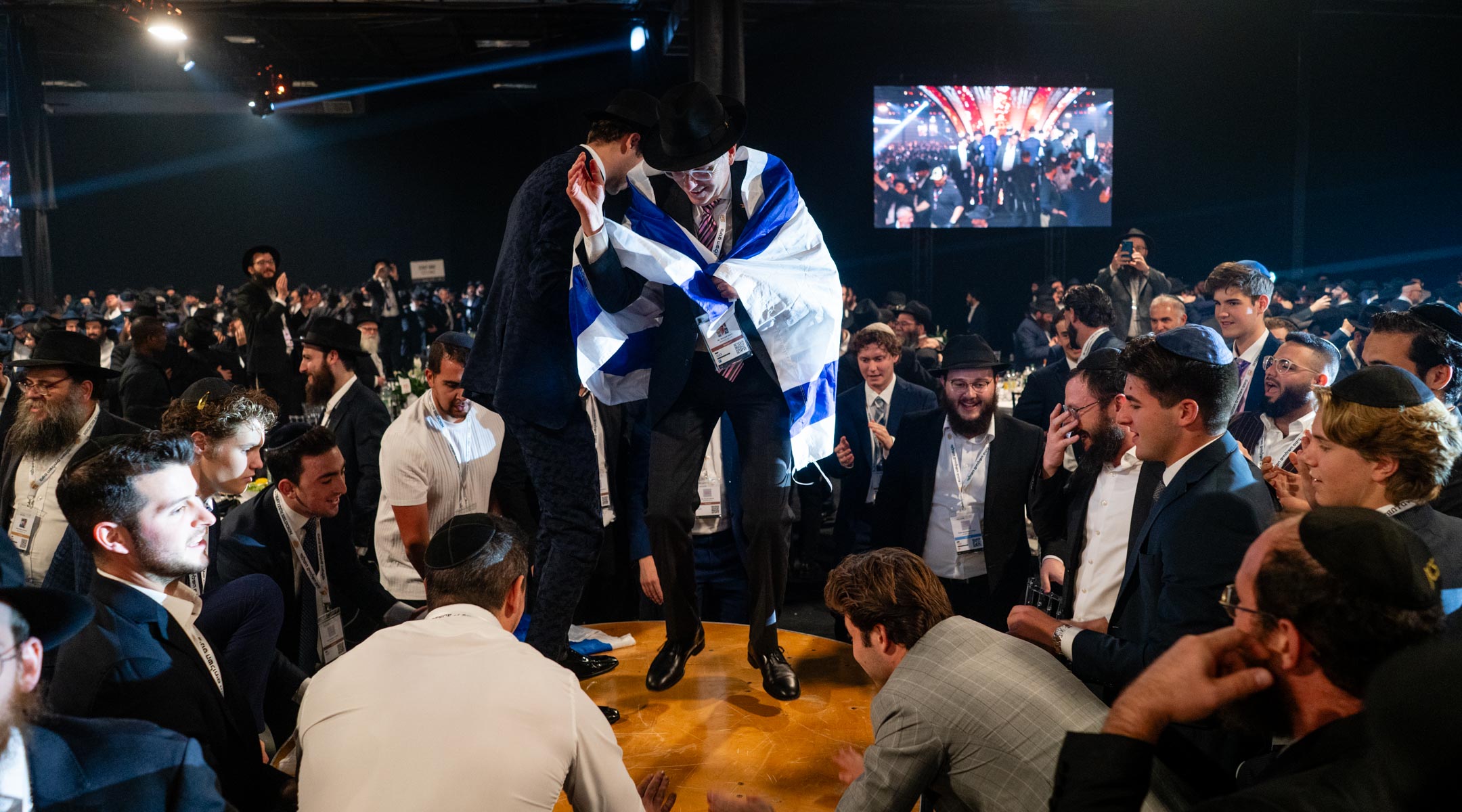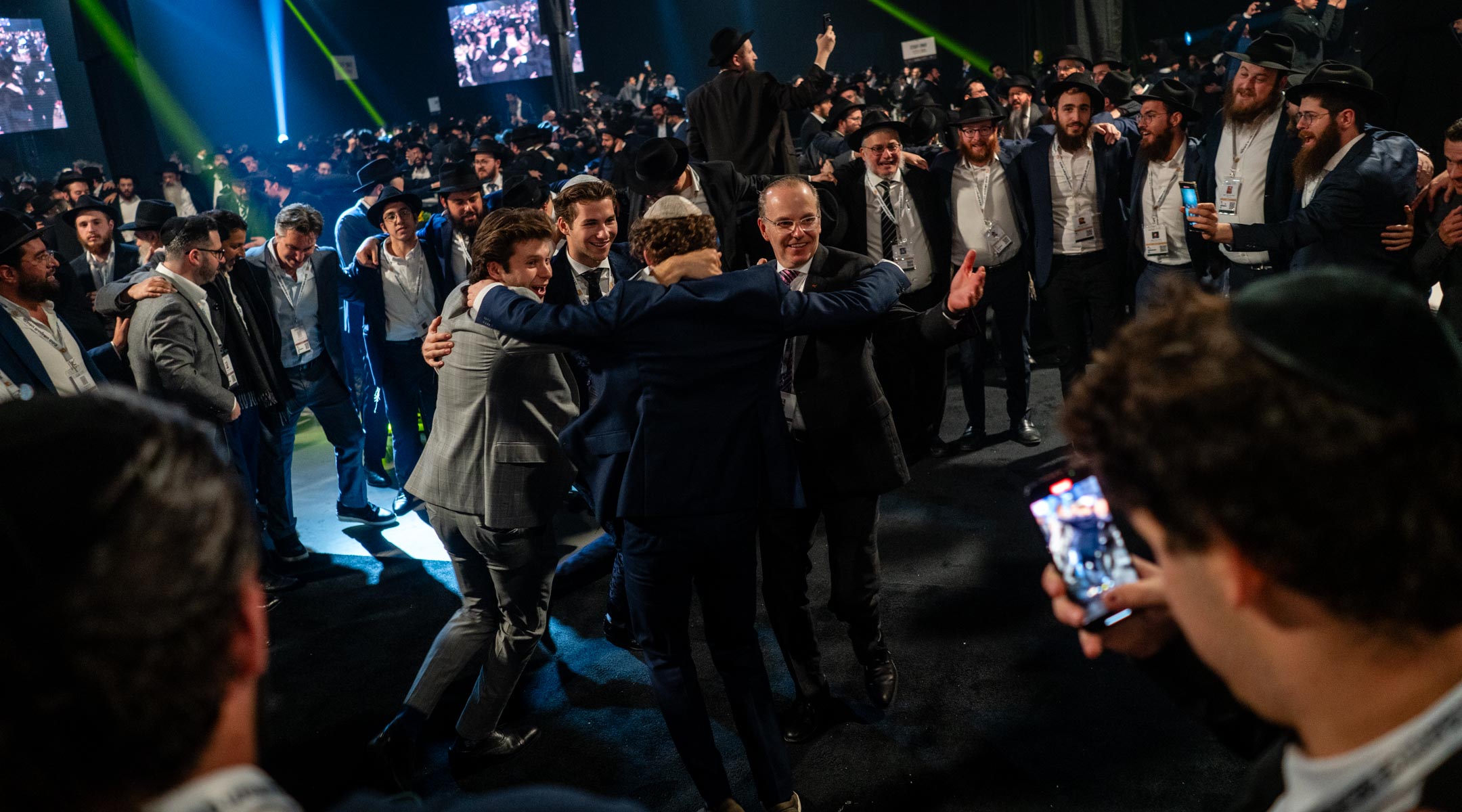Annual Chabad rabbis’ conference spotlights rise in Jewish engagement as attendees mourn Israel’s dead
The gala, which drew 6,500 people this year and is generally meant to be an uplifting celebration of Chabad’s Orthodox Jewish outreach work

The Chabad conference annual gala, in Edison, New Jersey, November 12, 2023. (Luke Tress)
(New York Jewish Week) – This year’s conference of Chabad emissaries featured the same highlights that have anchored the past annual gatherings of the Hasidic movement’s rabbis from across the globe.
The thousands of rabbis sat for a panoramic picture in front of the movement’s headquarters at 770 Eastern Parkway in Crown Heights. On Friday morning, they visited the grave of their late leader, Rabbi Menachem Mendel Schneerson, in Queens. And on Sunday, as they do every year, they gathered for a massive banquet at a convention center in New Jersey.
But this year much of the conference, planned months ago, had to change on short notice following Hamas’ Oct. 7 attack on Israel and Israel’s ensuing war against the terror group in Gaza — down to the time and guest list of Sunday’s gala. The movement’s 1,400 emissaries in Israel tuned in to the meal remotely, and it was moved from the evening to 12:30 p.m. in order to accommodate the time difference.
“We understand the magnitude of the moment and it’s our time to prove to ourselves and to the world that we live and believe,” said Rabbi Moshe Ze’ev Pizem of Chabad of Sderot, an embattled Israeli city on the border with Gaza. Pizem and other Chabad rabbis from the city appeared in a video showing destruction in the city’s streets and the rabbis collecting donations and visiting troops.
“When everything is fine, it’s easy to believe in God. When do we stand the test? When there’s a difficulty, an enormous difficulty,” he said. “Now is the test.”
The gala, which drew 6,500 people this year and is generally meant to be an uplifting celebration of Chabad’s Orthodox Jewish outreach work across the globe, included mournful elements within the festive atmosphere. It featured psalms for the victims of the attack and hostages, whose names scrolled on a screen as the Biblical verses were read aloud by Cantor Yitzchak Meir Helfgot. The Israeli emissaries, related their experiences on the ground in the past month; they gathered in Jerusalem during the dinner in New Jersey.
“We are davening for your release every day,” Helfgot said regarding the hostages, as the screens showed photos of the captives. At least one soldier from the movement was killed in the Oct. 7 attack, and some Chabad members from Brooklyn flew to Israel to serve in their reserve units after the war started.
But alongside the grief, the Chabad representatives, known as shluchim, who hailed from college campuses in North America to the Australian outback, reported an outpouring of Jewish engagement since Oct. 7. According to a survey by Chabad.org that garnered responses from 211 of the movement’s rabbis, 86% reported increased attendance since Oct. 7. The rabbis also overwhelmingly said community members had increased personal religious practice, felt “scared” and felt a stronger connection to other Jews, to Israel and to their own Jewish identity.
“We’ve seen the community has grown more together than ever before. So many people are asking, ‘What can we do?’” said Yossi Swued, rabbi at the Chabad of Western University in Ontario, Canada. “I feel like the whole world is shaking, everyone wants to do something. I think everyone should tap into that.”

The Chabad conference annual gala, in Edison, New Jersey, November 12, 2023. (Luke Tress)
The gala retained its joyful atmosphere: The elaborate event featured multi-colored lights coordinated to music and videos; smoke machines; crane-mounted cameras sweeping over the crowd; musical performances and speeches by Chabad representatives about their local communities. This week’s conference was for the men, while a parallel event for women emissaries will be held in February.
The meal grew especially lively during the traditional “roll call” that announces the numbers of emissaries in each country and again toward the end of the event when the entire room, almost entirely men, gets up to dance in circles. The rabbis swirled around inside a vast hall, hands on each other’s shoulders, as music blasted and colored lights flickered across the crowd. A group hoisted a table in the air, pumping the platform up and down while two men danced on top, waving Israeli flags, and others stood on chairs nearby to film the festivities.
Chabad says there are 5,813 families serving as emissaries in more than 100 countries around the world, from hundreds in places like the United States and France to lone representatives in locales such as Zambia. That reach has put the emissaries on the forefront of the global reaction to the Hamas attack and subsequent surge in antisemitism, both in areas with significant Jewish populations and those without. The emissaries said Jews approached them after the attack to get mezuzahs for their homes, attend services for the first time or study Torah.
Rabbi Menachem Aron, who serves rural Australia, said a Jewish man contacted him to request a new pair of tefillin after the attack, since the phylacteries were not available in the remote region where he lives.
“He’s 16 hours north of Perth, absolute middle of nowhere, but he knows that he can stay connected even during these times,” Aron said, adding that Australian Jews were grappling with antisemitism in both the city and more remote regions.
“We’re angry but we’re not scared,” he said. “People want to increase their Judaism. They want to put on tefillin, they want to light the Shabbat candles.”
Rabbi Aryeh Long of Camarillo, California, called the moment an “awakening” in his community. A man who lives near his Chabad center had never attended services before Oct. 7, but now comes in every day to pray. The man is an Israel Defense Forces veteran who served in the 1967 Six Day War and in recent weeks started doing volunteer guard duty at the Chabad preschool, Long said.
In El Paso, Texas, Rabbi Levi Greenberg said he received a call days after the attack from a local woman, who said, “Rabbi, I want to put up mezuzahs in my house. How quickly can we do it?”
“I ran over with some mezuzahs and right away we put them up,” he said. “People want to be more connected.”
This article originally appeared on JTA.org.
















